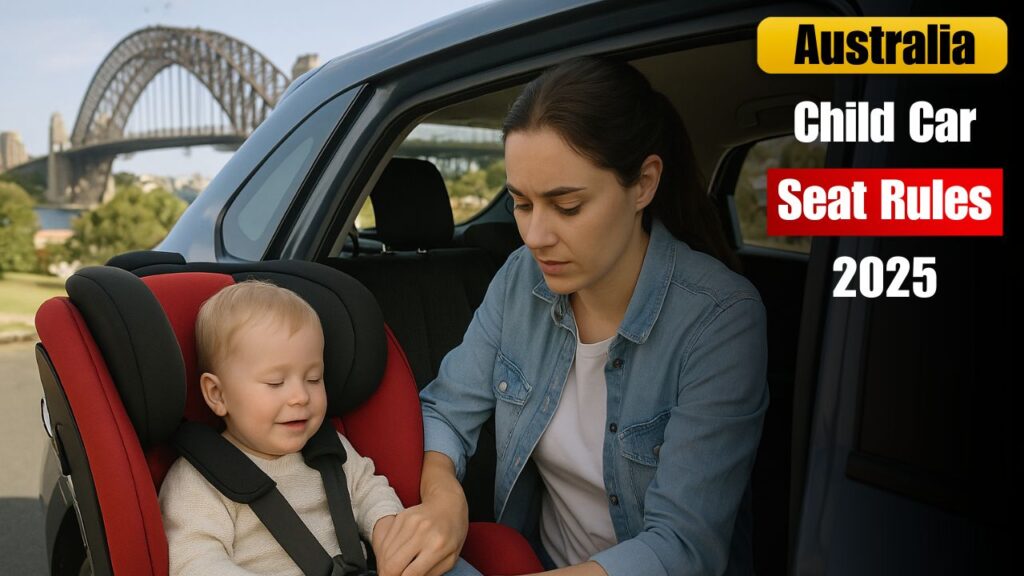Child Car Seat Rule Changes 2025 – Australian parents are being urged to review the latest child car seat rule changes coming into effect in 2025. These new updates aim to improve road safety for children by introducing stricter standards for car seat use and installation. The changes apply across all states and territories in Australia, aligning with international safety recommendations. Authorities have emphasized that correct seat positioning, restraint type, and child age are crucial for protection. As these rules roll out, families should understand how the new guidelines impact their daily travel routines and compliance requirements.

New Car Seat Safety Standards for Australian Parents
The 2025 updates bring major improvements to Australian car seat laws to ensure every child travels safely. The new regulations mandate age and height-based restrictions, clearer labeling on car seats, and tougher penalties for non-compliance. Parents must ensure children under seven are using the correct type of restraint that meets the updated Australian safety standards. These rules also cover booster seat designs and ISOFIX compatibility to simplify secure installation. The government’s focus is to reduce injuries caused by improper restraint use and to make compliance easier for Australian families across states.
Updated Child Restraint Rules Across Australia
Under the revised 2025 framework, child restraint laws will now be consistent across all Australian states. This means parents traveling interstate won’t face confusion over differing requirements. The new system focuses on a combination of child height and weight rather than only age, aligning with modern safety research. Furthermore, child seats must now display clearer expiration labels and meet updated manufacturing standards for crash impact resistance. Australian authorities will be conducting awareness campaigns to ensure parents understand and implement these updated child safety regulations effectively before enforcement begins.
| Age Group | Type of Seat Required | Height Limit | Key Rule Change 2025 |
|---|---|---|---|
| 0–6 months | Rear-facing capsule | Up to 70 cm | Mandatory side protection |
| 6 months–4 years | Forward-facing seat | Up to 100 cm | New ISOFIX fitting standard |
| 4–7 years | Booster seat | Up to 145 cm | Improved head restraint design |
| 7–12 years | Booster or seatbelt | Over 145 cm | Revised transition age rules |
| All ages | Certified restraint only | Varies | Must meet AS/NZS 1754:2025 |
Government Support and Resources for Australian Families
The Canberra government has launched new initiatives to help parents transition smoothly to these rules. Subsidized car seat checks and installation assistance will be available at authorized safety centers. Families can also access detailed guides online and through local councils. The initiative aims to reduce confusion and ensure all vehicles comply with national child restraint standards. This proactive approach reflects Australia’s growing emphasis on child safety and public education. Parents are encouraged to verify their current car seats against the new standard before the official enforcement date in early 2025.
Ensuring Compliance with Child Car Seat Laws in Australia
To comply with the updated child seat laws, Australian drivers should check their car restraint certification labels and installation method. Authorities recommend professional fitting sessions and regular checks for wear and tear. Failure to comply could result in fines or demerit points under new enforcement rules. These measures reflect Australia’s continued efforts to reduce road accident injuries among minors. The government urges parents to remain informed and proactive to make every journey safer for their children under the strengthened 2025 safety guidelines.
Frequently Asked Questions (FAQs)
1. When do the new car seat rules start?
The new child car seat rules will officially begin from January 2025 across all Australian states.
2. Are existing car seats still valid?
Existing car seats can be used if they meet the current Australian standard and are in good condition.
3. What are the penalties for non-compliance?
Drivers may face fines up to $600 and demerit points if found using an incorrect or unsafe child restraint.
 Age Pension New Rates 2025 – Updated Amounts, Eligibility & Full Payment Schedule Revealed
Age Pension New Rates 2025 – Updated Amounts, Eligibility & Full Payment Schedule Revealed
4. Where can parents get help installing seats?
Parents can visit authorized fitting stations or local safety centers for free installation checks and advice.



